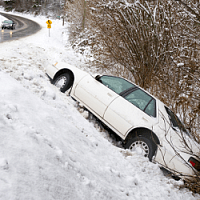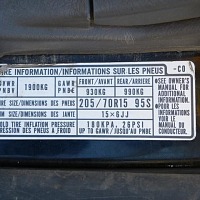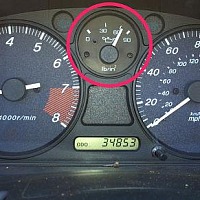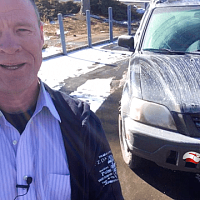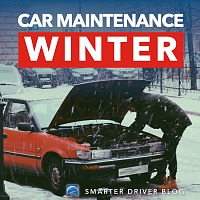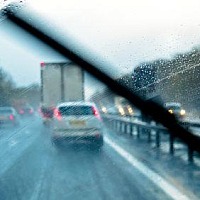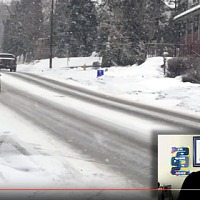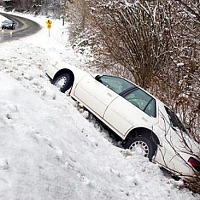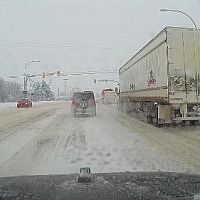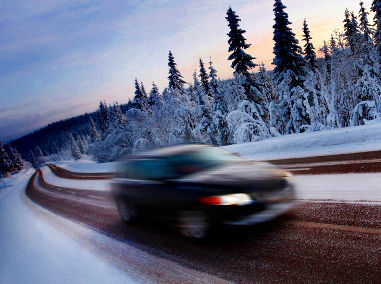Learn how to avoid tire blowouts by purchasing the right tires for your vehicle.
Prevent Tire Blowouts :: Buy Quality Tires for Your Vehicle
Closed Caption
Updated: Dec 2020
Introduction
- Hi there Smart Drivers, Rick with Smart Drive Test, today talking with Gary Krieger at Tireland here in Vernon.
Gary's going to give us some information about saving money and how to buy tires and which tires you should buy and fit on your vehicle.
Stick around, we'll be right back with that information.
(upbeat music) - Hi there Smart Drivers, welcome back.
Today we're talking with Gary Krieger here at Tireland in Vernon, and he's going to give us some great information about buying tires especially now that we're coming into spring and most of us are thinking of switching off our winters on to all-season tires or summer tires.
So, Gary, what are some of the recommendations that you might have for switching tires now that we're moving into the spring over here in the northern hemisphere.
Two Sets of Tires (Summer & Winter)
- Well one thing to consider is I would suggest at least two sets of tires, one for summer, one for winter, it just does a better job.
There are some places where all-weather is a new tire that's coming out where you can run it year-round.
It's legal for all the mountain passes but I'm a firm believer in the winter tires for winter, it just does a much better job.
If you're living in a place like Vancouver, all-weather tires would be a fantastic choice to put on then.
- Right, okay, so these tires that you're talking about that are all-weather tires that are okay for winter as well, they have a symbol on them that will indicate.
What's that symbol on those tires that will-- - They have a mountain snowflake symbol.
Definition of Winter Tires
- Okay and that tells.
So drivers can just look at the-- - Yes, it'll have M and S on the tire and it'll also have a four-peak or three-peak mountain and snowflake symbol usually right beside it, that makes it legal for the winter pass.
- Okay, excellent, because here in British Columbia it's not a requirement that we have to have snow tires but if you're driving on some of the mountain passes and whatnot, then you do have to have them.
- I would highly suggest.
- Okay.
- I would definitely suggest, especially if you are in a mountain pass, if you're in the valley bottom, no problem.
But through the mountains you want to have a good tire.
- Okay, now in one of the other questions one of my Smart Drivers, Sunny, asked me about steel studded tires, and they're legal to run here in British Columbia.
- They are so.
- Right, and we are coming up to the time here that they have to be taken off of the vehicle right.
We have a date actually for that.
- October 1st til the end of March.
- Okay.
- So, but that being said, if the weather is still bad in April there are people still running them.
Especially over the mountain passes.
Steel-Studded Tires
- [Rick] Okay, and what are some of the benefits, you and I sort of had this conversation yesterday, but what are some of the benefits to steel-studded tires.
- If you are in a place that has a lot of ice a lot of compact snow and ice, I am a firm believer in studs.
Studs dig into the ice.
Rubber just rides on ice.
So if you're up and down the, like up Silver Star, you like to ski a lot, the problem is not going up the Star it's coming down the Star.
So number one, it definitely helps with directional stability but also stopping ability.
Studs will definitely give you grip but it comes down to the directional stability and stopping, is where they really benefit you.
- Right.
- Yes.
- And that's really what we wanna be doing in the winter time, is being able to stop, right.
- Oh, yes.
- I mean it's one thing to get going but it's another thing to actually get your vehicle stopped with control and those types of things.
All right, so that's a good idea and now here in British Columbia we get a lot of hard pack and those types of things but if people just wanted to run regular winter tires, and not studded tires is what I meant, then there, is there a certain particular tire that you would recommend for that or those things.
What the #$#^%) Heck is Siping?
- Well tires that have a lot of siping in them, so the little cuts that are in the blocks that helps the tire work like a sponge, so it really works well on black ice, compact snow and ice.
It makes a big difference.
So the more siping, the more cuts they have in the tire, and also evacuation channels in the tire, make a big difference too, to help flush everything out of the tire.
- Okay, so they get a lot of snow in the tires and those types of things.
- [Gary] Yes, you can get buildup in the block, the sipes help to flex the block to help it, number one, give you grip but also to help evacuate the tire.
- Right, right, so that the treads are able to do the job that they need to be doing.
Excellent, okay, so now we're coming into winter time and you guys are coming, Tireland is coming into their really busy time of the year with changing back over this, to all-weather tires for most people.
Booking Time with a Tire Shop
What's the recommendation for people who are trying to book time with tire shops and those types of things to get-- - It's usually best to call at least a day or two in advance, make an appointment, that way it's the least pain.
That way you're not waiting, like there're some certain days where we're not that busy, other days where we need like 10 guys, so best to make an appointment that you're in and out, it's almost painless that way.
- Okay, perfect, perfect, now, say that somebody needed to come in and they were thinking that they needed new tires.
Signs to Indicate you Need New Tires
What are some of the signs, so for new drivers, a lot of the Smart Drivers are new drivers, what would be some of the things they'd be looking for on tires that would indicate that they needed a new set of tires on their vehicle.
- Well, tread depth is one for sure, the winter tire law and the summer tire laws are different.
In the winter you have to have 5/32 at tread dept, in the winter it's 2/32, or sorry, in the summer it's 2/32, the winter is 5/32 at tread depth.
So, I like tires that have evacuation channels so like some of these tires right over here.
They have the evacuation channels to help get, basically, the water out of the tire.
I'm a firm believer in tires like that.
Especially for safety, that's what the tires are for, you want a good safe tire to keep you on the road.
- Right.
Tire Warranties & the Cost of Switching Out Tires
- Another thing to consider is if you are going to keep the vehicle for four to five years, to save a little bit of money, consider an extra set of rims.
So, it usually takes about two and a half years to pay for that extra set of rims, but it will help you save money down the road.
- Okay, why is that.
That, you're saving money with extra rims.
- Well, for a change and balance can be up to about $110, just to re and re an extra set of rims on and off the vehicle are like 25, $30, so that's where you get your savings.
- Okay, so that's where you get your savings, that's an excellent point as well.
So, now we were talking about this previously about when people are buying all-weather tires, what are some of the things that, you know…
What to Consider When Purchasing Tires
I asked you whether it was money that people were considering in terms of purchasing new tires or whether it was the quality of the tire, and you said that it was-- - Both, a little of both, some people, they want a good economical tire on their vehicle they like to spend their money on something else.
Other customers, they want the best that money can buy.
- Right, right.
- And you definitely get the difference, as far as your top-of-the-line tires, they're are the quietest, the smoothest, the best handling, the longest lasting, definite benefits when you're buying the most expensive tires out there, there is a difference for sure.
- And most of these high quality tires as well they have a high warranty as well that comes with that tire, so, now one of the things that somebody said to me some years ago there's conditions to these warranties that the vehicle owner has to follow.
What are some of those conditions that they have to do, to meet, to keep their warranty in place with their tires.
Tire Maintenance
- Well the biggest thing is just yeah, definitely follow what the manufacturer is suggesting, like rotating the tires, checking the alignment every couple of years.
One thing to consider also, tires have a shelf life.
They're good for usually about seven years, most tire warranties are good for about five years.
There's a very odd one where they have a lifetime warranty, but they're rare, very rare.
- And I would think that the lifetime warranty would only come with, sort of the really high-end tires.
- That's right, that's right, yes, yes.
- Okay.
- Yes, yes.
Tires Have a Shelf Life: In Other Words, They Get OLD!
But one thing, like I say nowadays the biggest thing to consider is tires that are anything more than eight years old, you don't want them on your vehicle.
We've been having some tire failure issues.
And I do have an example here if you'd like to see it.
So I just thought I'd bring this as an example, now here's a tire here that has at least 40% tread, looks okay, the product code or the, sorry, production date are the last four numbers, you have your DOT and then it's the last numbers.
So, this tire was made in the 39th week of 2007.
The tire looks okay, the tire has decent tread, the problem with this tire here is in the side wall, it's critical.
In this tire here, it just about blew right off the wheel.
So this is a problem that we're starting to get with tires.
It is critical that you look at the date code on these tires.
It is for safety, because usually a tire like this, you'll be driving down the road, 110 kilometers an hour and they let go.
There's no warning, it just lets go, it explodes.
- So the tire basically, you're just driving on, you're just trying to control the vehicle on the rim.
- Just hope that you're on the road and not in the ditch.
- Yeah.
- Yes.
- Yeah, okay.
- Yes.
- No that's-- - That's a critical thing nowadays, is date codes on the tires.
You want to make sure that they're no more than eight years old.
Get them off the vehicle, it isn't worth your life.
- Okay, no for sure, that is tremendously helpful information.
Okay, so that's great, so I have one more question for you, Gary.
Brand New Vehicles and Their Tires
One of things, I had a friend who had a brand new vehicle, and she got like 20,000 kilometers on the tires and she took the tire into the tire shop and they said the tires were done.
- Yes.
- You know this was, - Yes.
- kind of shocking information for me that you have a new vehicle and the tires only last 20,000 kilometers.
- Well some of the brand new vehicles that are out there they just put cheaper tires on there.
So, yeah, it'll be 20, 30,000 kilometers for the original set on the summers or all-seasons.
That's all you'll get.
So the tires that we do sell, we can basically fit any budget that you want.
- Okay.
- So cheaper tires are usually good for about 50 or 60,000 kilometers, mid about 90 and then top-of-the-line tires are 100,000 kilometers and over.
- Okay, now say for a mid-sized vehicle, four new tires, you know say top of top line, what kind of price range would I be looking at sort of for that.
- Depending on size, a lot of the newer vehicles out there say if you had like a Chevy half ton pick up, they usually have a 17 inch tire on there.
Cheaper tires are about $160, top-of-the-line tires can go over 300, it all depends what you're, how much you want to spend and how good of a tire you want.
- Yeah, it's kind of like fitting accessories to your vehicle, - Oh yes.
- the sky's the limit, you can pretty much put any kind of tire on you want, right.
You know deeper tread, and wider tires and all that sorts of things, things that you can customize your vehicle they're going to run you a bit more money.
- Yes.
Questions to Ask When Purchasing New Tires
Okay, perfect, I think that's some really great information for Smart Drivers who are buying new tires and getting used vehicles and those types of things.
- Yeah, like there's a lot of information out there.
Ask a lot of questions when you're going.
Tell them what you do, where you go, how much you drive, are you a commuter, or are you just in town.
Are you up, going up and down the mountains.
There is a tire for every purpose out there.
- Right, yes.
(chuckles) Well that's really great information.
We'd like to thank Gary Krieger for talking to us today from Tireland here in Vernon.
Really great information about the tires and the critical role that they play on your vehicle.
So we'd like to thank Gary for that.
Thank you very much.




